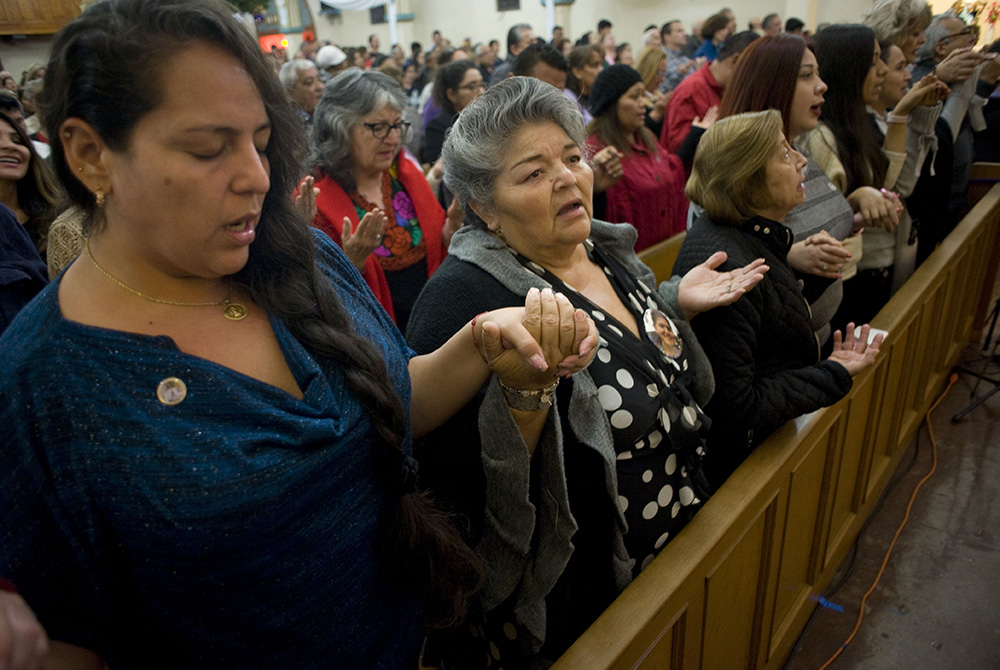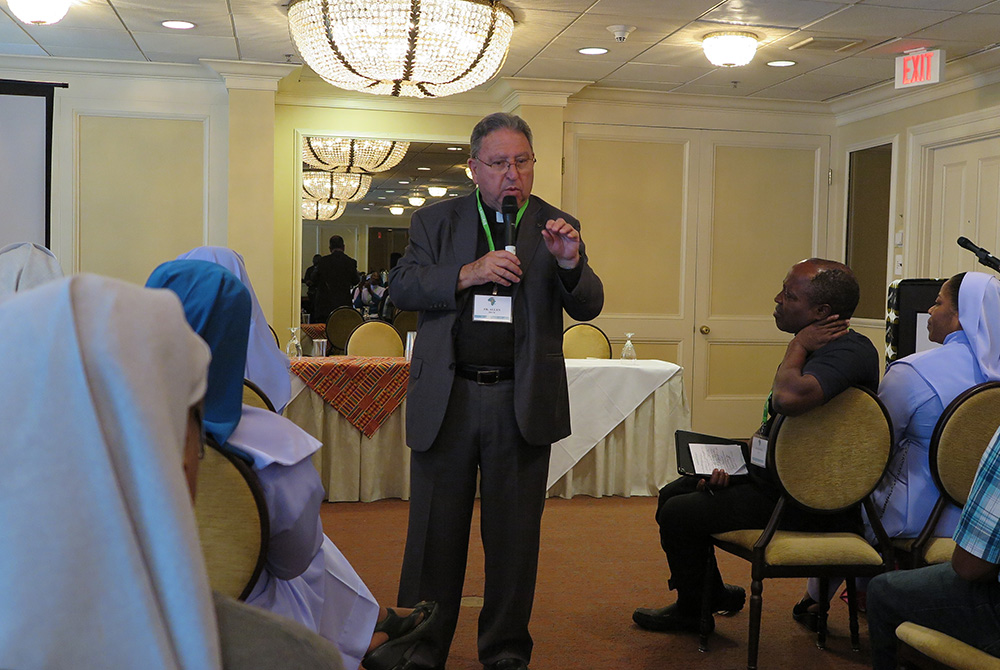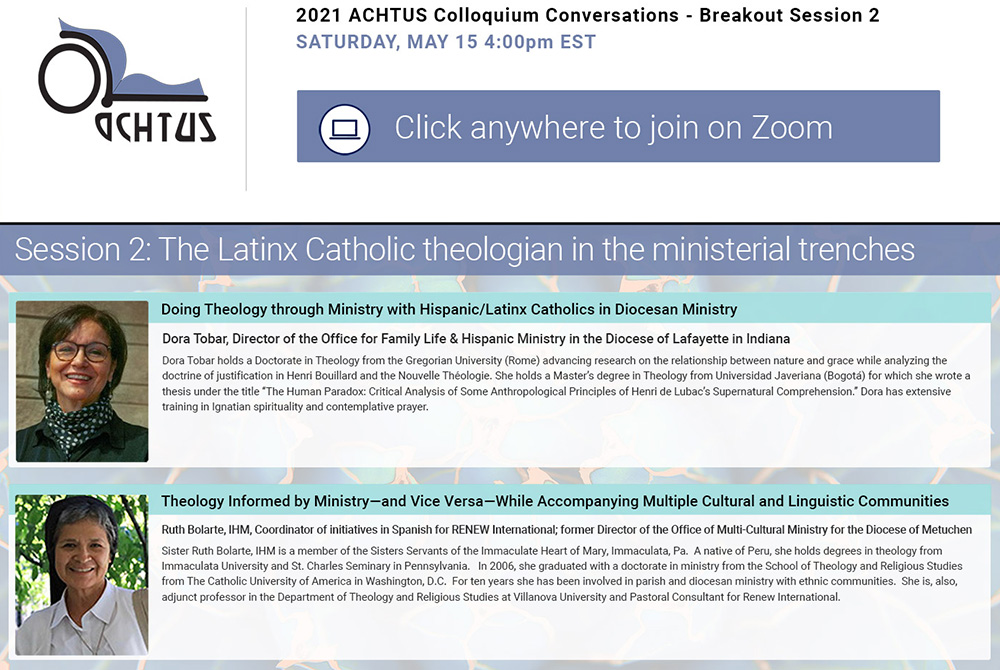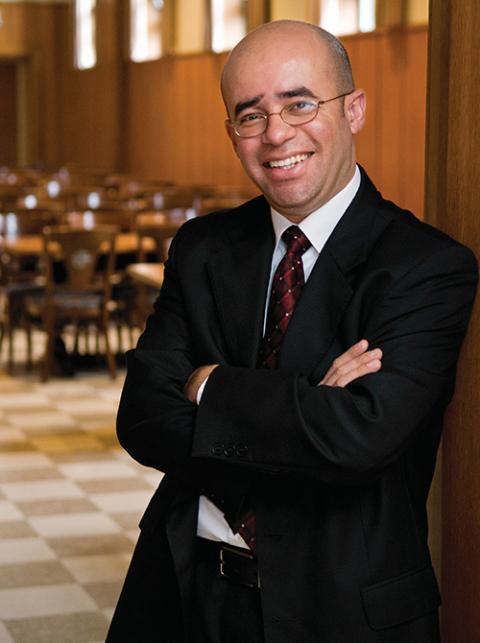
Worshippers recite the Lord's Prayer during a Mass celebrated in honor of the 100th anniversary of Our Lady of Guadalupe Church Dec. 9, 2017, in San Diego. The church was first founded to serve the recently arrived Mexican population in San Diego, and has become a cornerstone of the local Latino Catholic community. Participants in the virtual colloquium of the Academy of Catholic Hispanic Theologians of the United States discussed being a theologian in ministry, rather than in academics. (CNS/David Maung)
Last Saturday, I was able to join the Academy of Catholic Hispanic Theologians of the United States, or ACHTUS, for the second day of their two-day virtual colloquium. These virtual gatherings are never as much fun as visiting with old friends in person, but I am still glad I attended because the focus of the meeting was both refreshing and, I suspect, seminal.
Jesuit Fr. Allan Figueroa Deck of Loyola Marymount University, whom I knew from his days at the U.S. bishops' conference when he led the Committee on Cultural Diversity, led off with a talk that set the tone for the day. "It is good for us today to recall our origins especially in the face of the individual and collective trauma of the pandemic," he told his colleagues.
"We cannot allow this experience to turn us away from our original resolve to accompany our people, turn inward or acquiesce to theological and ecclesial introversion. Rather, we must be theologians callejeros [in the street] who 'smell of the sheep,' as Francis puts it. We must get out on the street and hacer líos, 'raise a ruckus,' as the pope exhorted youth in Rio de Janeiro."
Deck recalled that the group was formed out of the inspiration of Vatican II and, specifically, the vibrant theological and ecclesial vision that emerged in Latin America after the council and found expression at the meetings of the continent-wide episcopal conference, CELAM, at Medellin (1968), Puebla (1979), Santo Domingo (1992) and Aparecida (2007). He recalled, too, the experiences of the national Encuentros here in the U.S.
Noting the decline in religious identification in the U.S., which has now spread to Latinos as well, Deck also cited some of the reasons this decline should be viewed differently in the context of the Latino community:
We must remember that the identification of the majority of Latin American Catholics traditionally with the church is within the framework of popular religion rather than the highly standardized Tridentine Euro-American version of Catholicism. Latinx popular Catholicism stresses affiliation with the community of faith through baptism and living the faith domestically more than in the formal institutional structure of parish or diocese. We also know that this popular Catholicism informally led by women — our mamás and abuelitas — stands in sharp contrast to the middle-class, doctrinal and moralistic Catholicism of the United States. Latino popular Catholicism has flourished in parallel with and not in opposition to official religion, but has never allowed itself to be swallowed by it nor totally defined by it.
These realities have made the Latino church arguably more adept at confronting the challenges facing the church as it rebuilds from the pandemic nightmare through which we have all lived.

Jesuit Fr. Allan Deck gives the July 27, 2017, keynote address during the 18th annual convention of the African Conference of Catholic Clergy and Religious in the United States in New Orleans. He spoke May 15 during the virtual colloquium of the Academy of Catholic Hispanic Theologians of the United States. (CNS/Beth Donze, Clarion Herald)
Deck outlined the directions Latino theological and pastoral leaders should take as they seek to confront the task of rebuilding a post-pandemic future, one that coheres with Pope Francis' call for a church that is "siempre en salida," — always reaching out. He listed seven attributes of Latino ecclesial leadership, of which I should like to call attention to three: pastoral conversion, shaping leaders who are unafraid of the new; leadership with an Hispanic flair, "rooted in popular culture and not just in the ecclesiastical ethos or sub-culture, less moralistic, exclusive and doctrinal, and more performative;" and, leadership for justice, reconciliation and peace, not relying on dominant ideologies of left or right, but following "the Gospel's option for the poor, Patristic perspectives and Catholic social teaching."
In the breakout session I attended, entitled "The Latinx Catholic theologian in the ministerial trenches," Dora Tobar, director of the Office of Family Life and Hispanic Ministry for the Diocese of Lafayette, Indiana, joined with Sr. Ruth Bolarte of the Sisters, Servants of the Immaculate Heart of Mary, coordinator of initiatives in Spanish for Renew International, to discuss what it is like being a theologian in ministry, rather than in the academy.
Tobar noted the many ways the Latino community was especially afflicted by the pandemic, from historic rates of inadequate access to health care to the exclusion of undocumented migrants from the benefits being extended to others.
"We receive and pass life only and exclusively through connections," Tobar said. "On the other hand, death is provoked, allowed to happen, by disconnection, isolation, rejection and all kinds of marginalization. In a word, from sin. While sin divides us, God's salvation plan intentionally gathers everyone, in Christ, by His Spirit, in the powerful network of the body of Christ, where death is defeated when the pain or need of one becomes the pain of all."

Screenshot of the virtual colloquium of the Academy of Catholic Hispanic Theologians of the United States, featuring presenters Dora Tobar and Sr. Ruth Bolarte of the Sisters, Servants of the Immaculate Heart of Mary, who spoke May 15 about being a theologian in ministry, rather than in the academy. (Courtesy of ACHTUS)
She then explained the various ways she and her colleagues in pastoral ministry created the connections of solidarity that allowed life to sustain itself through the pandemic, from a WhatsApp network for identifying and fulfilling material and spiritual needs, to young adults offering tutoring online.
Bolarte also catalogued the pandemic challenges faced by parishes in multiethnic and multicultural neighborhoods and the thoroughly traditional way those parishes incorporated new leadership from migrants.
"The 'Domestic Church' is the place where the ethnic communities start envisioning a configuration that will support their effort to live their mission as baptized Catholics," she explained. "As their numbers increase and there is a need for a larger 'home,' leaders start the dialogue with local parishes and/or the diocesan bishop. Like the first waves of immigrants to the United States, it is their experience of being in the margins, of society and the church, that animates these initiatives."
She used theologian Peter Phan's concept of "Betwixt and Between" to structure the theological lessons she drew from the experience of the pandemic.

Hosffman Ospino, a professor of theology and religious education at Boston College and the new president of the Academy of Catholic Hispanic Theologians of the United States, gave the final presentation May 15, the second day of the ACHTUS' two-day virtual colloquium. (CNS/Lee Pellegrini, Boston College)
The final presentation was the presidential address by ACHTUS' new president, Hosffman Ospino of Boston College. Regular readers will know of my profound admiration for Professor Ospino's work, which I have cited over the years. So, I was not entirely surprised that he hit a home run in his speech to his colleagues.
Ospino spoke about the unique circumstance of their meeting: Instead of the conviviality that normally marks these meetings — including a presidential address given in the context of a banquet — this meeting was virtual. But in this oddity, Ospino found confirmation of an insight, a theological lesson. He said:
A third of the participants in this year's colloquium are Hispanic Catholic pastoral leaders who work in ministerial organizations, dioceses and parishes. Many of them have exactly the same academic degrees that we have, engage in critical theological reflection as we do, yet they chose to do their theology in settings that are not exclusively limited to the confines of universities and seminaries. I think that in this new historical moment, we cannot advance a sound and relevant theological discourse that claims to be Hispanic/Latino Catholic without seriously engaging in conversation with these pastoral agents and the communities with whom they journey every day.
In one of the small group discussions that afternoon, one theologian had expressed his enthusiasm for the fact that unlike so many academic conversations, this one had been grounded in reality. There was no ivory tower.
This concern to refocus academic theology by engaging those engaged in ministry is not only a practical concern, but a theoretical one. One of the core convictions of Hispanic theology, Ospino said, was its commitment to be defined by "our relationship with the communities from within which we come, where we work, and with whom/for whom we theologize."
This is complicated, however, by the very diversity of the Latino Catholic community, filled with people whose experiences, hopes, fears and faith are diverse. He offered a stark observation: "Many definitions of the Hispanic/Latino religious experience, more particularly the Hispanic/Latino Catholic experience, seem to be stuck somewhere in the second part of the 20th century."
Advertisement
Ospino called on his colleagues to begin rethinking some of their assumptions. In one of the more challenging parts of his speech, Ospino said:
Theological and ministerial categories that we hold dear in our theological reflection and ministry, as in the case of popular Catholicism, la mística, lo cotidiano, and teología de conjunto (and its ministerial version, pastoral de conjunto) among others, often sound foreign to the new generations of Hispanic/Latino Catholics in our nation, U.S. born and immigrant. In many theological and ministerial circles that I have been able to visit, such categories sometimes function as code words among educated Hispanic/Latino scholars and leaders, yet they say little to the larger populations in our church and in the academy, Hispanic and non-Hispanic [emphasis in original].
He pointed to specific areas in which more research is needed, such as the experience of the religiously non-affiliated, or "nones," and those second- and third-generation Hispanics whose ties to Catholic religious observance are attenuated. He noted that many younger Hispanics entertain multiple identities, of which "Latino" is only one and "Catholic" another. He warned against the presumption of an "unchallenged organic anthropology" that ignores the "fractures, fragmentations, vices, limitations and even sins that exist within our own communities and families."
In looking forward, Ospino sketched "three simple tasks" for Hispanic theologians as they contribute to the restructuring of the church in a post-pandemic landscape. In addition to a call for increased collaboration, "ad intra" within the universe of Hispanic Catholic theologians and also "ad extra," with others inside and outside the academy, and continued commitment to the practical, pastoral methodologies, Ospino called for "a renewed ecclesial consciousness."
He mentioned that he had engaged in a series of conversations with theologians in Latin America, noting:
As I listen to them, it is fascinating to observe how at ease these Catholic theologians are engaging church documents and other sources of Catholic magisterial reflection. This is something that I do not see regularly in the United States among Hispanic/Latino Catholic theologians. The 50th anniversary of the Second Vatican Council did not seem to spark much reflection among us. Except for sporadic commentaries and reflections by some of our members, the rich production of exhortations and encyclicals emerging from the pontificate of Pope Francis, someone we can easily call a Latino pope, has not found much echo — whether in the form of embrace or critique — in our Hispanic/Latino Catholic theological circles.
This echoes the concern expressed in a recent article at Commonweal by theologian Massimo Faggioli. The need to reconnect academic theology with the communities and structures of the Catholic Church is the most pressing task facing our country's theologians and I was delighted to hear Ospino articulate it so powerfully in his address. I must add that there was much else in Ospino's talk — and in the talks of others presenters — that I have not been able to address. Those interested should check in with the ACHTUS website where they will be published.
I am not a Latino, but I have loved Puerto Rican culture since I was introduced to it as a child and have always been made to feel welcome in other Latino cultures I have been blessed to encounter. And I have often said that I would despair of the future of the Catholic Church in the United States were it not for the Hispanic presence. Without them, we were in danger of becoming an upper-middle class club for people with conservative sexual ethics.
It is so hopeful to see leaders in the Hispanic theological community recognize some of the pitfalls of academic culture, especially in this moment in history, and to seek a kind of regrounding in the lived experiences of those theologians who engage in pastoral ministry. This was the opposite of a Twitter debate with its posturing and its vacuity.
"There are no atheists in foxholes," is the famous saying. This meeting of ACHTUS rightly encouraged its members to get into the pastoral foxholes of the Latino Catholic community, and find out how the Holy Spirit is at work. It was a wonderful experience.








